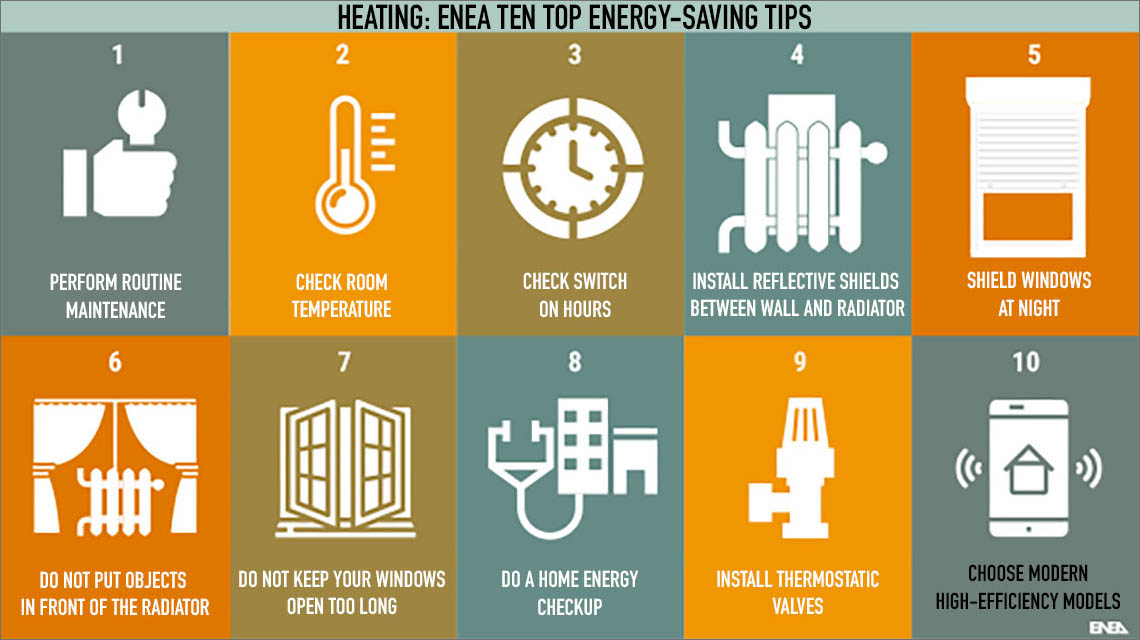Italian National Agency for New Technologies, Energy and Sustainable Economic Development

Energy: Heating, from ENEA ten top energy-saving tips
The winter season starts with new heating restrictions
ENEA’s guide "Key recommendations for an optimal use of gas heating systems" aims to facilitate the implementation of measures to reduce consumption of methane for domestic heating in compliance with the recent decree of the Ministry of Ecological Transition (No. 383 of 6 October 2022). Both the guide and the decree can be downloaded here.
“The first section of the manual makes reference to the legislative provisions and illustrates to citizens the main domestic heating management systems. The second provides practical indications on domestic heating systems based on the regulation and control devices installed”, explained Ilaria Bertini, Head of the ENEA Energy Efficiency Department.
The guide, which condominium managers shall distribute to residents, contains operating instructions on switching the systems on and off at the beginning and the end of the heating season, adjusting hot water and flow temperature to maintain indoor temperature at a maximum of 19°C, with certain exceptions.
ENEA has calculated that if implemented by 80% of Italian families, these measures could result in a national saving of 2.7 billion cubic meters of methane and about 180[1] euro less per year on average per user.
The guide also provides instructions on correct daily behavior, clearly indicating methods and times to ensure the necessary air exchange in air-conditioned environments.
The measures introduced by the decree set new time frames for heating systems in the winter season 2022-2023 (one hour less heating every day, postponing the switch-on date by 15 days) and the reduction of temperatures by one degree. Hospitals, nursing homes, schools, nurseries, etc. are exempt from the energy-saving measures.
"Renewing the air we breathe helps us to eliminate bacteria and pollutants. However, to change the air it is sufficient to keep the windows open for a few minutes, several times a day, preferably during the hottest hours and when the heating is off ", pointed out Bertini who highlighted how important it is also to maintain the right level of humidity in the environment by installing a thermo-hygrometer. “Humidity levels below 40% make the air in the house too dry- she said – encouraging viruses and bacteria to grow, favoring respiratory diseases. Humidity levels exceeding 70%, however, may lead to condensation forming on the cold parts of the building, such as perimeter walls and windows, causing mold formation and consequent allergies ".
With the start of the heating season[2], which this year started on 22 October in over half of the 8,000 Italian municipalities, ENEA suggested 10 energy-saving tips to better heat homes, save on bills and safeguard environment by reducing CO2 emissions.
Proper maintenance of the systems is rule number one, not only in terms of lower gas consumption but also of safety and attention to the environment. Before turning the heater back on, it is important to eliminate the air in the pipes and thoroughly clean the radiators to remove deposits that may have accumulated during summer.
It is important to remember that each degree increase over 19 ° C leads to a rise in consumption of up to 10%, considering that the temperature rises by 1-2 ° C after a person stays inside a room for 30 minutes.
Do an energy check-up of your home, relying on qualified technicians to assess the state of thermal insulation of walls and windows and the efficiency of the heating system. An energy diagnosis allows to identify possible improvement interventions that could reduce costs by up to 40%.
ENERGY-SAVING TIPS
- PERFORM ROUTINE MAINTENANCE
A well regulated heating system, clean and without limescale deposits runs more efficiently. Failure to carry out maintenance on heating systems will result in a fine starting from 500 euro (Presidential Decree 74/2013). - CHECK ROOM TEMPERATURE
19 degrees is enough to guarantee the necessary comfort at home. For each degree less you can save up to 10% on fuel consumption. - CHECK SWITCH ON HOURS
The daily operating period will be reduced by one hour a day. Check which of the 6 climate zones of Italy you belong to. - INSTALL REFLECTIVE SHIELDS BETWEEN WALL AND RADIATOR
Even a simple sheet of aluminum foil helps reduce dispersion towards the outside. - SHIELD WINDOWS AT NIGHT
Closing the shutters or using heavy curtains reduces heat dispersion. - DO NOT PUT OBJECTS IN FRONT OF THE RADIATOR
Placing curtains or furniture front of radiators is a waste of energy as it hinders heat diffusion. - DO NOT KEEP YOUR WINDOWS OPEN TOO LONG
It only takes a few minutes to air out a room. Leaving the windows open for too long causes unnecessary heat loss. - DO A HOME ENERGY CHECKUP
Rely on a qualified technician and have the efficiency of the heating system and the state of thermal insulation of walls and windows assessed. You can reduce consumption by up to 40%. - INSTALL THERMOSTATIC VALVES
Mandatory in condominiums, thermostatic valves allow you to reduce consumption by up to 20%. - CHOOSE MODERN HIGH-EFFICIENCY MODELSbr>>Replace the old boiler with a condensing boiler or a high efficiency heat pump and install chronothermostats, presence sensors and electronic remote controls.
Note
[1] The value was calculated on the Arera prices of the first quarter of 2022 as part of the ENEA study Actions for the reduction of the national gas requirement in the residential sector
[2] The switch-on calendar envisaged by Ministerial Decree 383/22 sets the first switch-on date 22 October for zone E, which includes, for example, Milan and Turin, although the mayor of Milan postponed switch-on times to October 29th. On 8 November it will be the turn of zone D (Rome and Florence), on 22 November of zone C (Naples and Cagliari), on 8 December of zone A and B (Reggio Calabria, Messina and Lampedusa). No limitations for zone F (for example Cuneo and Belluno).
